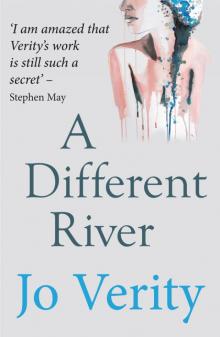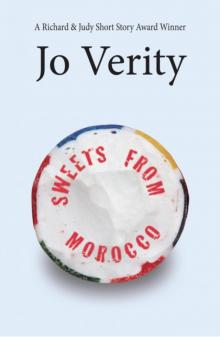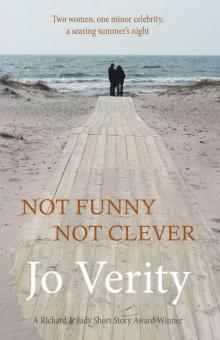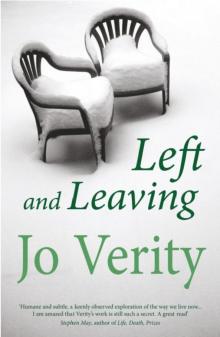Left and Leaving Read online
Page 2
After ten minutes the bus – a matching pair, in fact – arrived and he hauled himself up the stairs. Even after living in London for five years he still got a kick out of riding on the top deck. An extra kick if, as today, he managed to get the seat at the front, above the driver. As the bus lurched on, he planned what he would cook for Feray and the kids. They’d be hungry so it should be something quick and filling. Maybe, to save time, follow it with a ready-made dessert. Melissa was picky – Feray was getting quite worried about how little she ate – but she had a sweet tooth. Chocolate was always a winner. Okay. Pasta with a tuna and tomato sauce. Profiteroles. And, for Feray, a carton of fresh pineapple – her favourite – if there were any to be had by the time he got out of work.
The bus dropped him, along with a dozen others, at the corner of Hampstead Road and Euston Road, outside the glass and steel edifice that was the administrative hub of the hospital. He fell in with the stream of people making their way through the revolving doors and on through the atrium café to the bank of lifts. The coffee smelled good and he was tempted to join the queue but it was an expensive indulgence. The money he saved could go towards tonight’s meal. Besides, he was trying to cut back on his caffeine intake – shaky hands and cameras didn’t sit happily together – a vow which he made every Monday but which he invariably broke by Tuesday morning.
The lift bing-bong-ed its arrival and a subdued cohort shuffled in, reluctant to return to the grind after the weekend. The capsule ascended, the air inside prickly with perfume. Gil, who was averse to any aroma apart from coffee and cigarettes this early in the day, was glad to get out at the third floor. Checking the time on the clock above the door, he entered the open-plan office that served as base for several of the hospital’s non-clinical functions. It was a dreary room. The ceiling was oppressively low and, despite the expanse of windows running down either side, daylight failed to penetrate to its centre. Today, as on all but the brightest of summer days, the lights were on.
The Medical Photography Department amounted to a couple of desks, three PCs, a colour printer and a photocopier in the corner nearest the door. People were surprised to learn that the hospital employed only two photographers but, as Gil explained, doctors were type-A individuals. They could afford expensive digital cameras – nowhere near the spec of the big Nikon beasts at Gil’s disposal but good enough – and increasingly undertook their own photography. He foresaw that, before long, his function would be redundant. But there was no point in getting steamed up about that until it happened.
‘Good weekend, Gil?’ Terry called across from ‘Health and Safety’.
‘Not bad. Saw a great exhibition at the Tate.’
A maxillofacial consultant for whom Gil did a lot of work had given him two tickets for the Muybridge exhibition. ‘Another dropped bollock,’ he’d explained. ‘My wife informs me we’re off to a wedding. No use to me. Thought you might be interested.’
Gil had invited Feray to go with him. ‘What about the kids,’ she’d said. ‘They’re on their own every day until you get in from work.’ ‘I know but it’s…different at the weekends.’ He’d persisted, the kids joining in, rather too enthusiastically, he’d thought, promising to phone if there was the slightest problem.
They’d gone but Feray had been twitchy. They’d spent barely an hour looking at the photographs before she’d said, ‘I think I’ll head back. But you don’t have to come.’ He’d sulked all the way home and, instead of spending the night with her as he often did at weekends, he’d gone out for a few beers then returned to his own flat, slamming the front door and stomping across the hall to make damn certain she heard him. Tonight’s meal was by way of a peace offering.
Gil’s boss, Kevin Lisle, wasn’t in yet. Kevin had recently become a father and fractured nights were taking their toll. One of the few things that Gil remembered clearly from the days when his own kids had been newborn was the constant leaden-headed exhaustion. Another was the what the hell have we done? cloud that hung over him and Janey, darkening every day.
He switched on his machine and typed in his password. F.A.L.C.O.N.5.3.9. The model and registration number of the fourth-hand Ford he’d raided their savings to buy in nineteen eighty-nine. Janey, sleep-deprived and permanently on the verge of tears, was still breastfeeding Polly. It hadn’t taken much to push her over the edge and that car (God, he’d loved that car) became a cipher for everything that was wrong between them; every way he’d failed her.
The usual assortment of email awaited him. Requests from clinicians to photograph patients or write images to CD. A reminder that his ’flu jab was due. An invitation to contribute to a colleague’s leaving gift. Information on a cross-infection course he was booked to attend. Nothing out of the ordinary.
His first task each morning was to check the images he’d downloaded at close of play the previous day. Depending on what they were required for – patient records, lectures or displays – they needed cropping or resizing. It was a routine chore and an undemanding way of easing into the day.
That done, his time was spent photographing patients. This took place in the hospital a couple of hundred yards away, on the opposite side of Euston Road. His ‘home’ there was a studio on the lower ground floor where patients attending the various clinics came to be photographed. If they were incapacitated or unable to come to him, he took his equipment to the ward or the operating theatre.
The commute between hospital and admin building took place several times a day. It was a crazy arrangement but Gil looked forward to it. He enjoyed rejoining the outside world for five minutes, dicing with death as he negotiated four lanes of traffic. It also gave him the opportunity to snatch a sneaky fag. Theoretically, he’d given up smoking. Both his mother and Feray (although they’d never met or even spoken) were on his case and, seven months ago, they’d extracted his promise to quit. But by some distorted logic he’d persuaded himself that a few drags taken in this limbo-land didn’t count; that the damage the occasional Euston Road puff did to his lungs was nothing compared with the traffic fumes he inhaled.
As he was preparing to make the first trek of the day, his phone chirruped an incoming text from Kevin. They’d had another bad night and he’d be late in. Gil would have to cover but he didn’t mind. Taking a few extra photographs was a piece of cake compared with what Kevin – poor sod – was going through.
Gil had decided to become a photographer when, at the age of twelve, he was given a battered Pentax K1000 by a neighbour who had tired of the hobby. His father had helped him rig up a darkroom under the stairs and, with the aid of a couple of library books, he’d learned how to develop and print his work. Cartier-Bresson and Robert Doisneau were his idols and he’d daydreamed of tooling around Europe, capturing the spirit of the age – always in black and white. He imagined reproductions of his work adorning the walls of student bedrooms, smoky bars and cafés. And his stuff wasn’t bad. (His photograph of his mother pegging his father’s work shirts on the clothesline took second prize in the Gazette’s annual photographic competition.) But somewhere along the way he’d been distracted by girls and music and beer and, by the time he’d dealt with all that, he’d been forced to modify his dreams.
Taking photographs of leg ulcers or radical surgery couldn’t be described as pleasant but, given his aptitude with a camera and lack of squeamishness, Gil didn’t mind. On the occasions when he was called in to photograph a rare condition or groundbreaking surgery it could be quite fascinating. He was good with patients who found the hospital environment intimidating and were reassured by this middle-aged guy with his down-to-earth manner. Once they’d identified his accent, they were keen to chat about visits to family and friends in Australia, and naturally there was incessant cricket and rugby banter. He wasn’t heavily into sport but it was a useful means of easing patients through the unavoidable indignities of the process. The pay wasn’t great but it was sufficient for his needs. No. He wasn’t a latter-day Doisneau but he was doing a useful
job, and there were worse ways to earn a living.
At five o’clock Kevin, evidently delighted to have an excuse not to dash home, offered to finish up. ‘You get off. I owe you one.’
‘That’d be great,’ Gil said, picking up his jacket. ‘I’m cooking supper tonight.’
‘Special occasion?’
‘No.’
‘Aaah. Blotted your copybook, eh?’ Kevin winked and tapped the side of his nose, conveying his customary ‘women are the enemy’ message.
Gil felt a bit of a shit when he went along with Kevin’s ‘us and them’ rubbish. His boss wasn’t a bad bloke but Gil didn’t care enough about him to embark on a crusade to put him right.
‘You and Feray must come over soon. Meet Jack.’
Kevin held up a glossy A4 print of a baby’s face. Baby Jack’s eyes were barely open and he sported a roll of fat running across the bridge of his nose and above his eyes, making it look as though he’d gone the distance with Mike Tyson. He wore a beanie which was way too big, its stark whiteness accentuating the purplish-pink of his skin. The hat had two ears sewn to its crown and ‘Jack’ embroidered in blue on the front in case, Gil supposed, Kevin and Debbie forgot their son’s name.
‘He’s got a cheeky little face, don’t you think? He’s going to be a proper Jack-the-Lad.’ There was a hint of desperate hope in Kevin’s prediction, as if all his problems would fade away once his four-week-old son was into sex and drugs.
‘He’s a real beaut,’ Gil said, giving Kevin the reassurance he craved and himself a chance to make his getaway.
3
When Vivian emerged from the Tube station, it was raining. Less than an hour earlier the skies over Belsize Park had been streaked with winter sunshine but, whilst she’d been making the subterranean journey south, the weather had changed.
She set off briskly, dipping her head against the rain. Her father’s house was a twenty-minute walk from the station, via a dreary stretch of main road and a series of humdrum streets. She’d covered the route dozens of times and could navigate with her eyes shut.
Almost immediately beads of water were dripping from her hair, snaking down her neck and inside her collar. Checking that she had enough cash in her purse, she retraced her footsteps and slipped into the mini-cab office – little more than a cubby hole – located next to the Tube station. The bearded man seated behind the grille was studying a Sudoku puzzle. Behind him, in the gloom, two men in padded anoraks were hunched over a chessboard. The front man looked up but said nothing.
‘Farleigh Road, please,’ she said.
He turned, speaking sharply to one of the chess players who, eyes still on the board, lifted a set of keys from one of half-a-dozen hooks screwed into the tongue-and-grooved boarding behind his head.
Unbolting the door, the driver emerged from his secure enclosure. ‘This way please, madam.’
She used the firm when the weather was foul or she was pushed for time, but anyone new to Abbas Mini Cabs might have lost their nerve as they were led along the pavement and round to the side street where the anonymous vehicles were parked.
‘Farleigh Road,’ she repeated as the driver opened the rear door of a tired-looking Toyota.
The car pulled away, wallowing on its spongy suspension, and she remembered that she’d meant to call in at the Sainsbury’s Local opposite the station to pick up something for her father – a bar of milk chocolate or a puzzle magazine or a net of satsumas. These small offerings had become a ritual and she pictured him glancing at her empty hands, childishly disappointed.
The cab smelled of air freshener, the sickly scent exacerbated by the heater going full blast. Farleigh Road was only a couple of miles from where she’d grown up. The low-rise streetscape of south-of-the-river London, its hugger-mugger terraced houses, its down-at-heel shops, were familiar territory. She stared out of the window. It wasn’t worth engaging with the driver on such a short journey. What was the point of talking about the rain or the traffic or the state of the nation? All he wanted from her was the fare and a tip. All she wanted from him was to be delivered safely to her father’s door. He’d be relieved by her silence.
Although it was barely four o’clock when the cab pulled up, lights glowed in most of the houses along the terraced street. Number eighteen, however, was in darkness. A passer-by might think no one was at home. But her father was a stickler for switching off unnecessary lights and she knew he would be in the kitchen at the rear of the house – the place where he spent most of his time. She’d phoned before getting on the train to let him know that she was running late. On hearing this, he’d launched into his customary ‘No need to toil all the way down here. You’ve got enough to do.’ There wasn’t any need. She did have plenty to do. But that wasn’t the way it worked.
Her father had moved here a matter of months after her mother’s death. Vivian had suggested he wait a while before taking such a radical step, to see how he felt in a year, which seemed to be standard advice following bereavement. He’d been pushing eighty-two when he was widowed. Most old men would have been content to sit tight, cocooned in memories. Not Philip Carey. Once mooted, the notion of moving set in his mind like a dollop of concrete in a drainpipe and he’d forged relentlessly ahead with the sale of the house which she still hazily thought of as ‘home’.
His neighbours had expressed surprise when the board appeared in the front garden, shocked to learn that not only was he moving but that he intended living alone in his new home. Octogenarian widowers were expected to throw in the towel and retreat to sheltered accommodation or a small bungalow. Certainly not a three-bedroomed house with awkward stairs and a sizeable garden. Once they’d got over their surprise, they’d praised his courage in ‘battling on alone’, obviously assuming that he couldn’t bear to remain in a place steeped in his late wife’s presence.
A broken heart wasn’t what drove him – Vivian was sure of that. He was moving because it suited him to move. When the time came, he methodically whittled down the thirty-one years that he’d shared with Anneliese, systematically purging her from his life, or so it seemed to Vivian. He left her to take whatever of her mother’s personal belongings she wanted and, as they bagged the remainder – clothes, books and knick-knacks – ready for the charity shop, she had been the one who was weeping.
She stood on the step, experiencing, as she always did when she came here, a blend of apprehension and reluctance. She sighed. Had she come first thing, she would be back in her flat now. But she’d allowed the morning to drift away in a fug of coffee and newspapers. Then, when she’d taken a jacket to the dry cleaners, she’d run into a girl from the Pilates class that she sporadically attended and been persuaded to go for lunch at the Italian Café.
Despite the set of front door keys entrusted to her ‘just in case’, she wasn’t comfortable with letting herself in to her father’s solitary world. She rang the bell and peered through the stained glass panel at the top of the door. After what seemed too long, light from the kitchen flooded the hall and she watched his silhouette growing as he made his way towards her.
He opened the door a few inches and studied her warily before slipping the chain off its rail. ‘Vivian?’
‘Of course it’s me,’ she said.
It seemed colder inside the house than out and the air smelled of fusty dishcloth. She took off her jacket and draped it over the newel post, hugging herself and shivering. ‘You should put the heating on, Dad. I pay huge amounts of tax so you get your winter fuel allowance.’
Ignoring her remark, her father led her into the kitchen. It was warmer in here, the windows fogged with condensation. The source of the heat was one of the burners on the gas cooker. Her father had stationed his chair – a prosaic winged effort, upholstered in serviceable beige fabric – in front of the cooker, as if it were an open fire. On a stool next to him were his newspaper, spectacles case, several library books and a packet of cough sweets.
‘Sit yourself down,’ he said. ‘I’ll make
the tea. I haven’t had mine yet. I waited for you.’
The implied criticism of her lateness. The suggestion that tea was rationed and that he was only allowed one cup per afternoon. She’d been in the house a matter of minutes and already the skirmishing had begun. While he was filling the kettle, she took one of the two dining chairs that were tucked under the formica-topped table and placed it alongside his, watching him fussing with mugs and tea bags.
She would never forgive her father for being old. He had been fifty, her mother twenty-five when they married. That was their choice. But then they’d been selfish (or careless) and, the following year, produced her.
Even before she went to school, she noticed that her father neither looked nor behaved like other dads. He had grey hair and a little moustache. He wore a tie and shiny, lace-up shoes. He raised his hat to ladies in the street. Other dads laughed and played and made themselves available. They took their children swimming or to the park or taught them to play tennis. Hers drilled her in good table manners, insisted she change into slippers as soon as she came in and trained her to be silent when he was reading. By his demeanour, he made it clear that ‘fun’ fell outside his remit. He was a thief because, by being old, he had stolen something from her.
Anneliese Krüger had been Philip Carey’s second wife. Vivian knew little about Elspeth, her predecessor, except that she came from Dumfries and, after fourteen years of marriage, she’d upped and offed back to Scotland to marry a cousin, taking their two sons, Richard and John, with her. As a child, when asked whether she had brothers or sisters, Vivian had answered ‘no’, simply not understanding that these men, twenty-odd years her senior, who occasionally came to visit her father, and to whom she’d barely spoken, could be her brothers. As far as she was concerned, she was an only child. Even now, at the age of thirty-six, she felt the same way.

 Bells
Bells A Different River
A Different River Sweets From Morocco
Sweets From Morocco Not Funny Not Clever
Not Funny Not Clever Left and Leaving
Left and Leaving Everything in the Garden
Everything in the Garden